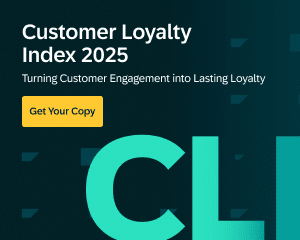Artificial Intelligence (AI) is revolutionizing the retail industry, from how consumers shop to how brands operate behind the scenes. To explore this transformation, we interviewed two industry experts: Holly Devine, a fashion and retail strategist, and Matthew Gardner, a retail technology consultant. Their perspectives offer a compelling look at how AI is being used, underutilized, and what retailers should consider when integrating it into their customer experience (CX) strategy.
Meet Your Retail Experts: Holly Devine and Matthew Gardner
Holly Devine is a Retail and Fashion Executive Advisor at SAP and an advisor for Consumer Products. She has helped companies support their strategic and operational goals and confront a demanding business environment. Today, she’s combining business expertise with SAP’s capabilities to assist people in organizations in making great, informed decisions on transformation.
Matthew Gardner is a Retail Executive Advisor at SAP with more than 25 years of experience in the retail industry, having held leadership positions at companies including The Kroger Co., Office Depot, and Sports Authority. As an executive consultant, he collaborates with clients to accelerate positive outcomes – helping retailers explore relevant emerging capabilities, market insights, and best practices to guide profitable investment decisions.
Let’s start with a fun question! What’s your personal favorite use of AI during the shopping experience?
Holly: “As a consumer, I want you to make my shopping experience faster, easier, and more targeted. AI can help in all of those ways. Whether it’s image recognition, smart suggestions, or personalized copy, the goal is to remove friction and make the experience feel intuitive and tailored. These features are especially impactful in fashion and lifestyle retail, where personalization drives engagement.”
Matthew: “AI-generated review summaries and third-party vetting tools are what I use most. They help me quickly understand a brand’s trustworthiness and related customer sentiment. For individual items, AI review synthesis and trust scoring – either on a given product page or across social sites – streamlines evaluation and selection significantly. Tools like these empower consumers to make informed choices more quickly, saving the time and effort of sifting through dozens of insights by hand.”
Product recommendations are a popular way for consumers to use AI. When using AI to search for products or compare them, which tools are most used?
Holly: “ChatGPT is probably the big gorilla in the room, but in my family, we’re big fans of Claude. You should explore multiple AI platforms because each model brings unique strengths to product comparison and feature analysis.”
Matthew: “I typically start with Perplexity, as its standard capabilities help me vet products and categories quickly. My favorite prompt format of the moment is, ‘Compare the similarities and differences of [xyz] in a series of tables,’ as the AI does an excellent job deciding which facets are most pertinent to present.”
Matthew also shared a more technical approach—opening multiple windows and asking the same question to different leading models like GPT-5 or Claude 4.5 to compare their outputs. He also praised Google’s ‘AI Mode’ for a second opinion and Google Gemini for its ability to verify outputs from Perplexity, highlighting how different AI tools can be used sequentially to get to meaningful insights more quickly.
How do you think AI tools are being underutilized by retailers?
Holly: “There’s a fear and trust factor when thinking about why some retailers aren’t using AI effectively. Some brands are way out at the forefront, and some brands are like, ‘heck no.’ It’s really all about brand DNA: who wants to be the vanguard and who prefers to follow. But in areas like finance and supply chain, AI isn’t coming for your job, it’s coming to make your job easier.”
Matthew: “If a retailer’s enterprise data isn’t up-to-date and accessible from across all relevant sources, AI tools can sound convincing while misguiding our strategies in predictive analytics and demand forecasting. Robust context engineering, not just prompt engineering, means bringing together just the right ingredients so our AI tools have what they need to deliver meaningful results. In this way, retail associates can gather product knowledge, discover substitutions, or get task guidance not just easily, but with confidence.”
What should retailers look for when implementing an AI tool?
Holly: “I think you want it to be non-threatening and humanistic. When you talk to these AI agents, you want it to be natural language—you don’t want to have to be a developer or programmer or a data scientist. You want to be a citizen. You should be able to say in natural language, ‘Hey, ChatGPT or, in SAP’s case, Joule, and ask something like, ‘Where should I put my next store?’ or ‘What’s the next position I should hire for?’ It should feel like a very human conversation.”
Holly advocates for natural language interfaces that democratize access to AI insights, making them usable by non-technical staff across the organization.
Matthew: “Start with real problems you need to solve, experiment with small initial tests, and only roll out the solution more broadly if AI delivers meaningful results. It’s also good to have a standardized vetting process before integrating new AI tools too deeply.”
Matt then offered a comprehensive checklist:
- Robust data security and governance to protect first-party data
- A composable architecture for future flexibility
- Seamless integration across your ERP, CRM, and CX platforms
- Low latency in the features that matter most
Why do you think it’s important for retailers to integrate AI across their entire CX suite?
Holly: “AI shines where you can do anything you can do to make your employer, associate, or consumer experience reduce the friction. Make experiences more personalized, make engagement more precise. There’s no more brute force anything in this day and age. You can’t employ an army of marketing analysts to deploy campaigns. So how can you use something like SAP Engagement Cloud to drive tactics like increasing frequency, order value, or retention? And don’t just limit AI usage to marketing. AI technology should be involved in finance, supply chain, logistics, and distribution, too. All aspects of a brand have use cases for AI. And if you don’t try it, you’re actually leaving money on the table. So, you’ve got to at least try it and decide what you like and what you don’t. Where I come from, it was embraced to fail fast. Try it, and if it doesn’t work, pull the plug. But fail fast. Don’t wait.”
Matthew: “Integrated AI empowers retailers to orchestrate complete journeys that feel like relationships rather than transactions. It’s about making the customer insights you have both relevant and reliable. When done responsibly, this integration has customers feel both seen and understood, appreciating a seamless brand experience from discovery to repeat purchase. This is only possible if context is maintained across touchpoints and that context is used consistently and conversationally in the way only AI can.”
What role does AI play in shaping personalized customer engagement and long-term loyalty strategies?
Holly: “You may be a known customer to a brand, or you may be a new customer to a brand. So, anything retailers can do to refine those experiences matters. I come from an e-commerce background, and we always talked about how to merchandise the bricks-and-mortar store versus the e-commerce store. Just being able to sense those clues from a customer about what they know or don’t know helps you make the experience better for them. AI can really help retailers personalize buying experiences and expand loyalty.”
Matthew: “AI helps retailers predict the next best action—whether it’s the content a customer sees, the offer they get, or the timing of the interaction. It’s about sensing and adapting to the customer’s context, whether they’re on mobile, desktop, or in-store. For example, we can detect churn risk using behavioral models and launch a retention campaign before it’s too late. AI also enables us to balance consumer needs with our business objectives, evaluating customer urgency and preferences alongside inventory levels and margins. This means loyalty isn’t won by blanket ‘20% off’ coupons but by offering incentives that ensure customers are happy and that we stay in business. That’s the exciting potential of AI. It’s not just about automation. AI helps retailers build relationships that are deeper and more meaningful than ever before.”
Five Takeaways for The Dawn of Intelligent Retail
To help you translate these ideas into action, here are five takeaways that capture the opportunities, challenges, and mindset shifts needed for the dawn of intelligent retail.
- AI should enhance, not replace, human experience
Both experts emphasized that AI should be non-threatening and human. AI is not about replacing jobs. Instead, AI is a tool to power speed and efficiency. Retailers should focus on tools that allow natural language interaction and empower everyday users to make strategic decisions without needing technical expertise.
- Data quality is everything
Matt introduced the concept of context engineering, stressing that the effectiveness of AI depends on the quality and accessibility of the data it’s fed. Retailers must unify and clean their first-party data to unlock the full potential of AI in areas like demand forecasting, personalization, and predictive analytics.
- AI is underutilized in operational areas
Retailers often limit AI to marketing or customer-facing tools, but both experts highlighted its potential in finance, supply chain, logistics, and employee experience. These areas are ripe for automation and optimization, and AI can drive significant ROI when applied holistically.
- Personalization drives loyalty
AI enables retailers to move beyond selling products to curating experiences. As Holly says, “Don’t sell me an item, sell me an outfit. Expand loyalty and share of wallet by presenting complementary categories”.
Whether it’s recommending outfits instead of items or tailoring loyalty programs to individual preferences, personalization is key to building long-term customer relationships.
- Integration across the CX suite is critical
To deliver a seamless customer journey, AI must be integrated across all touchpoints from discovery to post-purchase support. Disconnected systems lead to inconsistent experiences, while unified data and AI orchestration create a frictionless, personalized journey.
As Matthew says, “Most retailers feel like they have multiple personalities. As customers, we want more of a friendship — where we’re steadily seen and understood no matter where we next meet your brand.”
AI as a Catalyst for Reinvention
As Holly and Matt both emphasized, retailers must embrace a spirit of experimentation and exploration. Whether it’s streamlining operations, personalizing engagement, or enhancing loyalty, AI offers unprecedented opportunities to deliver value at every touchpoint. Retailers who lean into AI thoughtfully, strategically, and holistically will thrive in this new era of customer experience.







